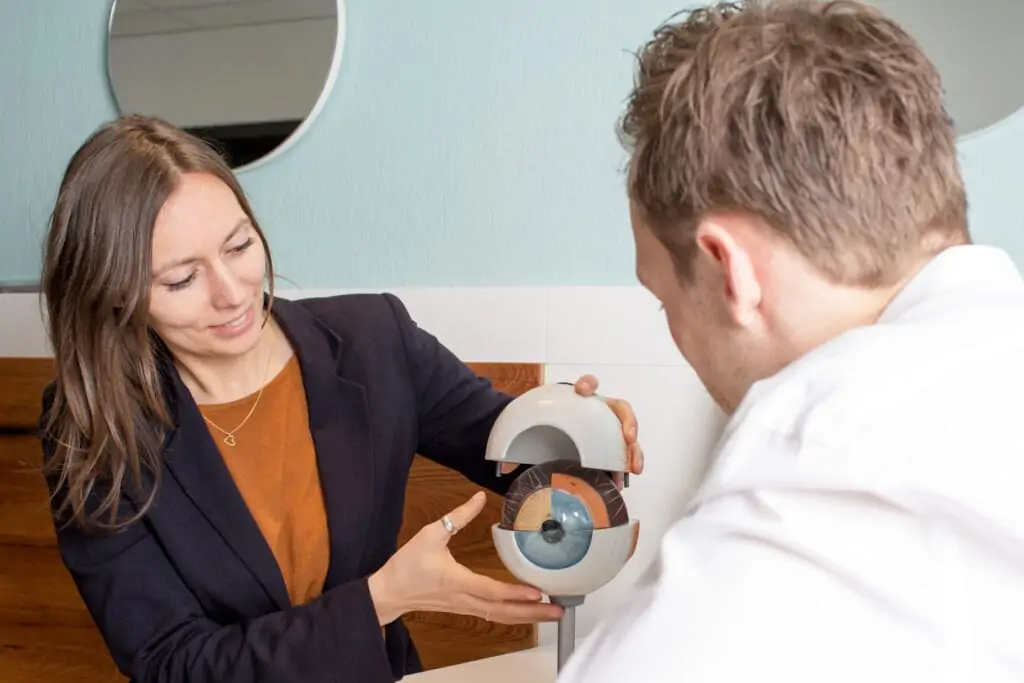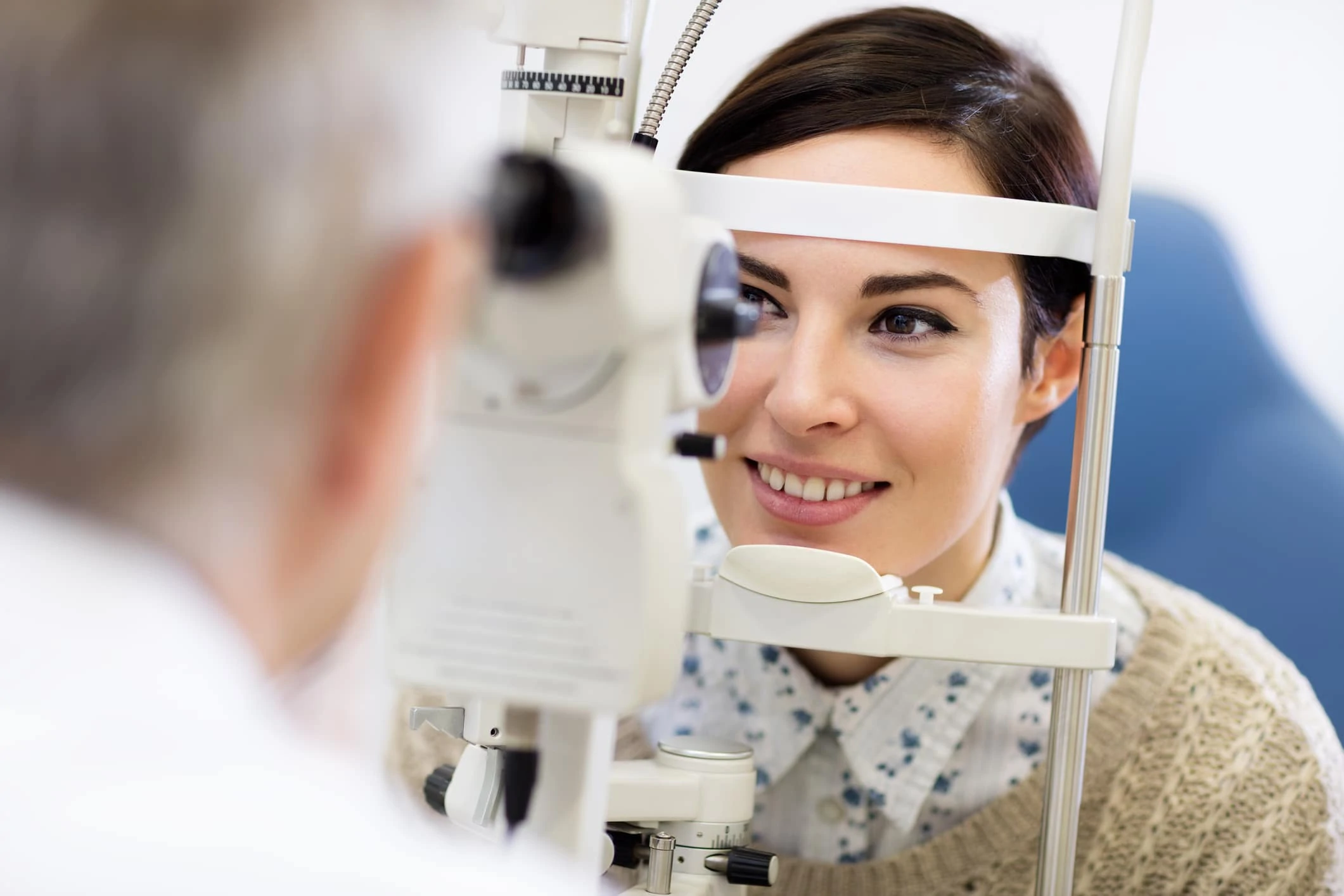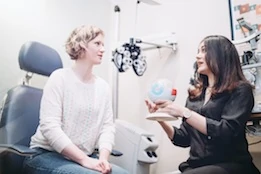5 Eye Exam Tips for Making the Most of Your Next Visit

While managing our health and wellness has been a critical priority over the past year due to coronavirus, some of the other more routine, annual doctor visits (including the annual eye exam) may have fallen by the wayside. But, with long hours in front of the computer, fogging eyeglasses and dry eyes from wearing masks, and trying not to touch our faces to help avoid infection, our eyes deserve to move to the top of the health priority list in 2021.
Your annual eye exam is important for the health of your eyes. It is also an important time to talk about vision correction – whether it’s glasses, contact lenses, or exploring whether laser vision correction surgery is right for you. We have five eye exam tips for talking to your eye doctor about your vision in the time of COVID-19.
Eye Exam Tip #1: Talk about the impact of the pandemic on your vision and eye health
If you have noticed issues with your eyes and vision over the past year during the pandemic, it is important to bring it up during your eye exam. Ask yourself:
- Are you struggling with dry eye symptoms, eye strain, vision fatigue, or annoyances such as foggy glasses from wearing masks all of the time?
- Have you been worried about your need to touch your face so often to adjust glasses or deal with uncomfortable contacts?
- Are your ears sore from carrying both your glasses and the straps from your mask?
Your eye doctor appreciates having your vision and eye issues put into the context of the life you have been living this past year. Things that might not have been too problematic before the pandemic may not be so tolerable now. As a result of the pandemic, many practices now offer telehealth visits. These visits are great for starting the conversation with your eye doctor from the comfort and relative safety of your home.
Eye Exam Tip #2: Track changes in your experience with your glasses or contact lenses
It is important to discuss your experience with your current vision correction. Answer these questions for yourself and share your responses with your eye doctor:
- Are your glasses giving you the vision you want?
- Do they work for all aspects of your life and lifestyles?
- If you wear contact lenses, are they comfortable?
- Are you wearing your contacts less?
- How disciplined are you with your contact lens hygiene?
- Any new or worsening symptoms since your last eye exam?
You want your eye doctor to understand your everyday experience with vision correction.
Eye Exam Tip #3: Share any significant changes or plans in your life
Going through life means change for most people. Some of those changes can increase the demands of your vision and vision correction. Oftentimes life changes make it obvious, others less so. Some milestones, plans, and beginnings make glasses less desirable or make it harder to take proper care of contacts. Here are a few scenarios:
- Are you getting married?
- Are you having a baby? New parents often find it difficult to manage with glasses. They also may be too busy to follow the wear and care instructions for contact lenses.
- Do you have a new hobby? Taking on a new fitness routine, longing for adventure in the great outdoors, or joining an amateur athletic team? Thinking through how your vision correction supports you in doing the things you love is important.
- New job? Some positions require additional safety gear (goggles, helmets, etc.) that can make wearing glasses uncomfortable. Some jobs, like military, police, or emergency responders, can’t afford to be let down by glasses or contacts – they need their vision to be mission-ready.
- Parents of young adults heading off to college or living on their own for the first time might be concerned that – without supervision – their kids aren’t being careful with their contacts, putting the health of their vision in danger.
Make a point to talk to your eye doctor about changes in your lifestyle during your eye exam. It can help make the conversation about your vision correction needs more productive.
Eye Exam Tip #4: Consider whether LASIK is an option for you
More than 20 million people have benefited from having LASIK eye surgery over the last 20 years. There is a huge amount of clinical data supporting LASIK and other laser vision correction procedures as safe and effective. More than 7,000 studies of LASIK have been conducted. By any scientific and medical standard, LASIK is safe and effective.
Some like to start with the internet and, if you are looking at credible sources – think Mayo Clinic, AllAboutVision.com, and, yes, the Refractive Surgery Council (RSC). RSC provides evidence-based information about LASIK and laser vision correction. Talk to friends and family who have had the procedure. Ask them about their experiences and questions to ask your LASIK doctor. Have a conversation about it with your general physician as well as your eye doctor.
Eye Exam Tip #5: Find out what kind of eye doctor is taking care of you
Your eye doctor is your partner in both your eye health and achieving your best vision. However, not all eye doctors perform laser vision correction procedures. Your regular eye doctor might be an optometrist – a medical professional eye care provider who can prescribe glasses and contacts as well as diagnose and treat certain eye conditions. Your regular eye doctor might be an ophthalmologist, a medical doctor who can diagnose and treat the entire spectrum of eye conditions. He or she makes recommendations about vision correction choices. Some ophthalmologists have additional surgical training specifically for vision correction procedures. These ophthalmologists are known refractive surgeons and they are the experts in laser vision correction procedures.
If you are working with an eye care doctor you have a good relationship with, you shouldn’t feel awkward or uncomfortable bringing up your frustrations with your glasses or contacts. A telehealth visit is an excellent opportunity for such a conversation. Understanding your personal experience with vision correction, both for yourself and for your eye care doctor, is an important first step in making sure you have the best vision possible.
Schedule Your Annual Eye Exam
So, if you are interested in moving beyond glasses and contacts for vision correction, trust your eye doctor. Start the conversation about LASIK or other laser vision correction options. If your eye doctor isn’t a refractive surgeon, he or she may refer you to one for treatment. You can also find one in your area on your own. Importantly, after having LASIK or any other type of laser vision correction procedure, you still need annual eye exams with your eye doctor.
Once you have selected an eye surgeon, the next step is to schedule a consultation. This includes a thorough eye exam to help determine if you are a good candidate for LASIK, SMILE, PRK, ICL, or another vision correction procedure.




